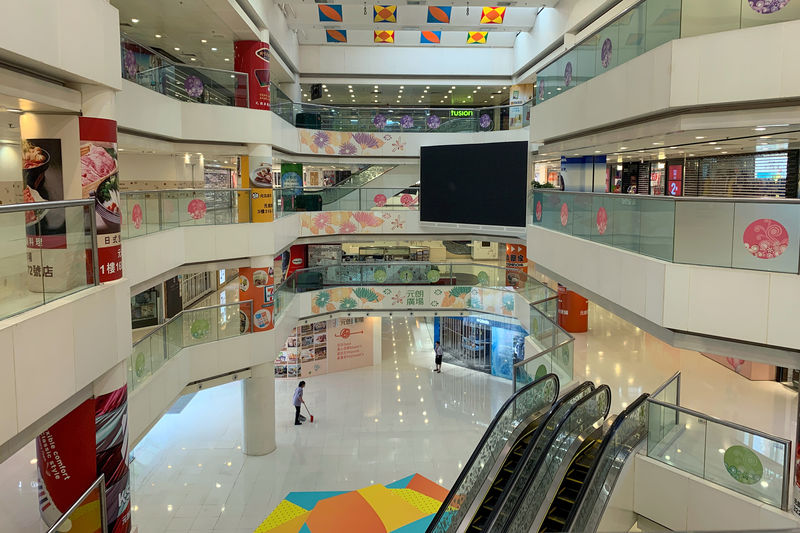By Farah Master, Sarah White and Silvia Aloisi
HONG KONG/PARIS/MILAN (Reuters) - Global luxury brands from Prada to Cartier are counting the cost to their businesses of four months of unrest in Hong Kong that has kept tourists away and forced shops to shut, with upcoming results set to reveal the damage.
Hong Kong, which ranks among the world's top five luxury destinations, has long been a magnet for brands attracted by the flow of visitors from mainland China. The city accounts for between 5% and 10% of the estimated $285 billion annual global sales of luxury goods, according to Bernstein analysts.
But data on Wednesday showed retail sales had fallen 23% in August from a year earlier - the biggest decline on record - while the value of sales of jewellery, watches and other valuable items decreased by 47.4%.
Visitor arrivals dropped 39%, with the number of mainland tourists to Hong Kong falling 42.3%.
"We don't see any light at the end of the tunnel," said the chair of Hong Kong Retail Management Association, Annie Yau Tse.
After the pro-democracy demonstrations started in June, the impact on second quarter results was muted, but that is expected to change in third quarter results as brands from Hermes to Tiffany grapple with store closures.
RBC analyst Rogerio Fujimori, who has just visited Hong Kong, estimates most brands will suffer sales declines of between 30% to 60% in the third quarter. Bain & Co now sees the global luxury sector growing this year at the low end of the 4% to 6% range, said analyst Claudia D'Arpizio.
Watchmakers in particular are likely to be hurt – Hong Kong is a major centre for high-end timepieces – and Switzerland's Swatch Group (S:UHR) and Cartier-owner Richemont rely on Hong Kong for 11 to 12% of their global sales.
Around 30 major shopping malls had to shut down during anti-government protests which turned violent on October 1, marring celebrations for the 70th anniversary of the founding of the People's Republic of China.
The closures come during the annual Golden Week holiday – usually one of the busiest periods for retailers in the city.
"Business has obviously been very affected. We were losing lots of sales and now the closures make it harder. It's much harder for us to get customers," a Gucci salesperson at the brand's store in the Pacific Place shopping mall told Reuters, speaking on condition of anonymity.
SHOPS CLOSED
U.S. jeweller Tiffany, which counts Hong Kong as its fourth biggest market, has said the impact on its business has been material although it has invested in new shops - both in Hong Kong and mainland China - which it hopes will help counter some of the disruption to its sales.
"The traffic in shopping malls is nowhere where it used to be, and we are also struggling sometimes to keep our stores open," CEO Alessandro Bogliolo told Reuters in late August.
France's Hermes (PA:HRMS), which makes $10,000-plus leather Birkin handbags, said in September it had been forced to temporarily shut some of its five stores as well as an airport shop in Hong Kong.
Chanel put a fashion show planned for Nov. 6 to present its "Cruise" collection on hold, saying it would happen at a "later and more appropriate moment."
But most companies are not rethinking their business plans more drastically yet and Tiffany went ahead with the opening of its One Peking Road flagship store in September as planned.
Some luxury brands, like LVMH (PA:LVMH), are likely to be able to absorb the hit thanks to rising demand in mainland China and other Asian countries - Hermes has already said as much.
LVMH, which makes around 6% of its revenue in Hong Kong, kicks off the industry's reporting season on Oct. 9. It declined to comment on the impact from the protests so far. Its big sales drivers like handbag maker Louis Vuitton or fashion label Christian Dior have been enjoying strong demand in recent months from mainland China, echoing trends at Kering's (PA:PRTP) powerhouse Gucci.
CHINESE TOURISTS SHOP ELSEWHERE
Lots of rich Chinese tourists are going on shopping trips to Japan instead of Hong Kong, an industry source said. South Korea, Australia and Singapore are also benefiting from Hong Kong's decline, analysts say.
Chinese customers have also been encouraged to shop at home by the government's import tariff and VAT cuts. But some brands in turnaround mode, including Italy's Tod's (MI:TOD) or even recovering fashion label Prada (HK:1913), have not seen as big a bounce on the mainland as LVMH or Hermes.
"For those groups that have a well developed retail network across Asia, the Hong Kong protests do not necessarily mean losing money," said Luca Solca, an analyst at Bernstein.
As an example, Solca said that winter jacket maker Moncler (MI:MONC), whose CEO Remo Ruffini sounded a cautious note on the group's outlook for 2019 because of the turmoil, had about 30% fewer stores in mainland China than Gucci or Vuitton.
Luxury goods in Hong Kong are also cheaper than in mainland China - in the case of fashion, the price can halve.
"Some Chinese could decide to buy fewer items - or just wait for the protest to end, whenever that might be," Solca said.
In the meantime luxury firms are asking Hong Kong landlords to cut their sky-high rents.
Local press reports say Prada plans to quit its 1,400 square metre store right in the retail heart of Hong Kong next year because of dwindling sales. Jefferies analysts said the landlord of that building is negotiating a 44% cut in rental costs. Prada declined to comment.
All major brands are trying to renegotiate rental terms, according to a second industry source, as they look to cushion themselves from the impact of the protests.

(additional reporting by Claudia Cristoferi in Milan, Silke Koltrowitz in Zurich, Melissa Fares in New York; Editing by Elaine Hardcastle)